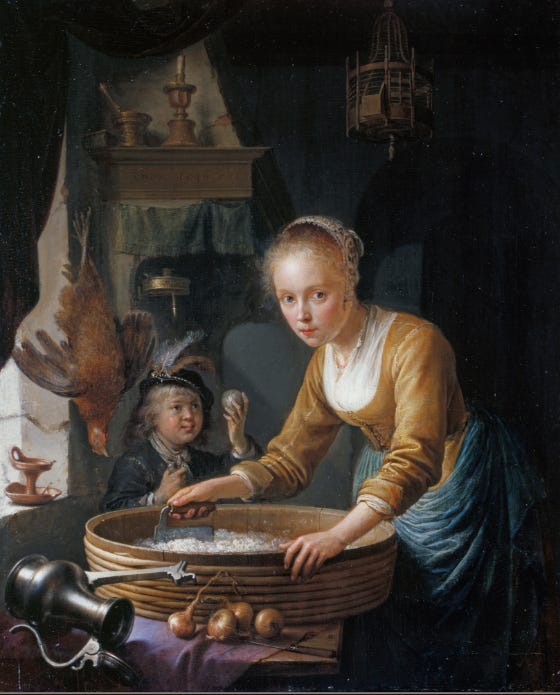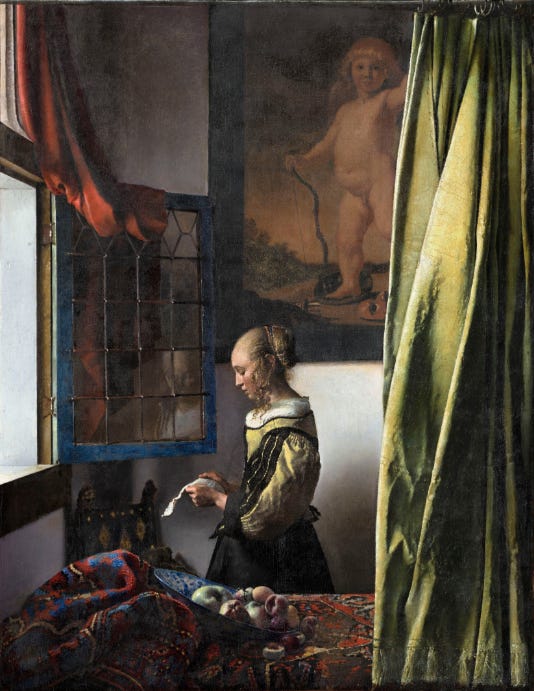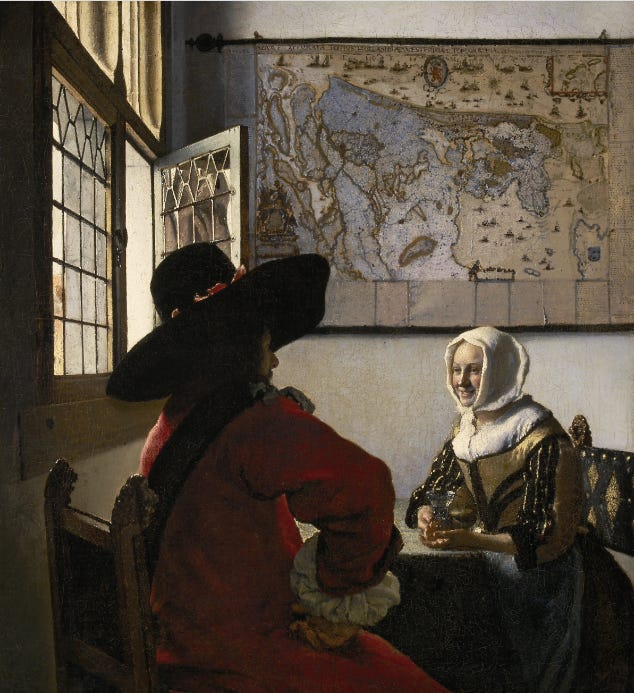“I find myself a very rising man”
Pepys Show: August 1662
My wife is still in the country; my house all in dirt; but my work in a good forwardness, and will be much to my mind at last.
At night writing in my study a mouse ran over my table, which I shut up fast under my shelf’s upon my table till to-morrow, and so home and to bed.
August 1662 finds Pepys hard at work, still trying to understand the needs of the navy, heading up and down the Thames to visit ropeyards, to learn about tarring, to try and get a handle on all the waste in the military and the abuse of the Chatham Chest, the pension fund for disabled sailors. At one point he stops along the Thames at a place called Ham Creek and finds two completely derelict ships, “without any living creature aboard,” and all the supplies and material stolen. The navy is getting ripped off on timber and even on flags, “the greatest cheat that I have yet found.” Pepys’s wife is away in Brampton while renovations continue on their house—the roof has been removed so they can add an extra storey to the house. Pepys is staying at Sir William Penn’s while Penn is in Ireland. He’s avoiding the theatre and not drinking, but maybe that’s not a good thing, because soon he finds himself tempted in other directions.
Penn, evidently, left some of his servants behind, and Pepys remarks on the first that, “God forgive me, I was sorry to hear that Sir W. Pen’s maid Betty was gone away yesterday, for I was in hopes to have had a bout with her before she had gone, she being very pretty. I had also a mind to my own wench, but I dare not for fear she should prove honest and refuse and then tell my wife.” He’s thinking about women a lot this month, and though he’s got up to some stuff with bar wenches in the past, this month he’s only contemplating it—mostly a lack of opportunity, I think.
In the past, Pepys scholars have ascribed his sexuality to a hypothetical irritation in his genitals, supposedly the result of the operation he had a few years before the diary began, in which his penis was cut open to remove a kidney stone. That’s reductive and removes his agency, etc etc, but it is interesting to note that this month he often complains of a pain in his cods, at one point so severe he’s afraid to ride a horse. I don’t know. Make of that what you will.
On the sixth, he “can hardly keep myself from having a mind to my wench, but I hope I shall not fall to such a shame to myself.” On the seventeenth he’s excited by a “pretty and sprightly” lady at Temple Bar, which he recalls is where he first met his wife. Dining on Fleet Street on the twentieth, he notes “the mistress of the house a pretty, well-carriaged woman, and a fine hand she hath; and her maid a pretty brown lass. But I do find my nature ready to run back to my old course of drinking wine and staying (away) from my business,” so he leaves early for home. On the twenty-third he can’t get a boat to take him on the Thames, because the Queen is coming and there’s a sort of river parade. Everyone stops what they’re doing to watch it, but Pepys is watching the King’s mistress, Lady Castlemain, “where I glutted myself with looking on her.”
Tom, Pepys’s brother, has found a woman he’d like to marry. She lives out in the countryside, but seems to be worth enough money that Pepys will consider it.
Pepys patched things up with Sir William Batten last month, but he just can’t help gossiping, agreeing with Sir Carteret that Batten is, “is going down the wind in every body’s esteem.” He finds a friend in Robert Waith, who is “pleased to see anything work against” Batten. And Batten himself is “much troubled, and did yesterday morning walk in the garden with me, did tell me he did see there was a design of bringing another man in his room, and took notice of my sorting myself with others, and that we did business by ourselves without him. Part of which is true, but I denied, and truly, any design of doing him any such wrong as that. He told me he did not say it particularly of me, but he was confident there was somebody intended to be brought in, nay, that the trayne was laid before Sir W. Pen went, which I was glad to hear him say. Upon the whole I see he perceives himself tottering, and that he is suspected, and would be kind to me, but I do my business in the office and neglect him.”
On the twelfth, Pepys disputes a warrant signed by Batten’s clerk and insists on another being signed, but Batten wants to take the matter before the full navy board. Pepys agrees to it and tries to insist he’s being magnanimous, but in the evening feels disquiet about the dispute. On the eighteenth, Pepys goes to Waltham Forest to learn about timber, and “Sir W. Batten passed by in his coach, homewards from Colchester, where he had been seeing his son-in-law, Lemon, that lies a-dying, but I would take no notice of him, but let him go.” Damn, that’s cold.
And yet Pepys is two-faced about Batten, dining with him on the twenty-seventh, and laughing at Batten’s stories of “the Mayor of Bristoll’s reading a pass with the bottom upwards; and a barber that could not read, that flung a letter in the kennel when one came to desire him to read the superscription, saying, “Do you think I stand here to read letters?” He also sells his hogshead of sherry to Batten, being glad to have money instead of wine.
In royal-related gossip, Pepys hears from his friend, the surgeon James Pearse, how the man that the king is cuckolding duelled with Hugh Cholmley, usher to the queen. Cholmely, “proved too hard for Montagu, and drove him so far backward that he fell into a ditch, and dropt his sword, but with honour would take no advantage over him; but did give him his life: and the world says Mr. Montagu did carry himself very poorly in the business, and hath lost his honour for ever with all people in it, of which I am very glad, in hopes that it will humble him.”
At the Royal Exchange on the fifteenth, Pepys hears rumours of some arrested Quakers, who “would have blown up the prison in Southwark where they are put.” The Act of Uniformity is due to take effect in on the twenty-fourth, which would institute the Book of Common Prayer as the official liturgy of the Anglican church, although at this point few people have had a chance to read its new edition. There are also something like 2000 clergymen refusing to take an oath required by the act, and so due to lose their positions. For dinner, Pepys is wined and dined by a timber merchant with navy dealings, but assured the diary he’s no friend of the man, after dinner there’s a juggler who, “shewed us very pretty tricks.”
On the seventeenth, Pepys goes to hear the farewell sermon of a presbyterian set to lose his position due to the Act of Uniformity. The church is packed, Pepys says he hasn’t seen a church so full since he was a child, everyone waiting to see if something will happen, but those expelled seem to accept their fate and are ready to go peacefully. Still, the city is on edge and a lot of people are against this act, and there’s a fear that the strife of the last the Civil War could kick off again. On the twenty-fourth Pepys hears about “a great many young people knotting together and crying out “Porridge” often and seditiously in the church, and took the Common Prayer Book, they say, away; and, some say, did tear it.” Porridge apparently being a slur for the Book of Common Prayer. “It is a thing which appears to me very ominous. I pray God avert it.” Some Presbyters are clapped up at the end of the month, and the traine-band militias are keeping a tight watch.
But it’s not all bad news. On the twentieth, Pepys is summoned to his patron, Lord Sandwich, who he finds still in bed. Pepys is to be assigned to the Tangier Committee, “which is a very great honour to me, and may be of good concernment to me.” I think it’ll be December before he’s officially sworn in. The committee deals with matters related to the English colony in Tangier, Morocco. Pepys’ friend and rival Mr Creed will be on the committee, as will Prince Rupert of the Rhine, with Pepys later claiming that all Rupert did in meetings was to laugh and swear occasionally. “I find myself a very rising man,” writes Pepys.
The month ends with Sir William Penn returning suddenly from Ireland, meaning Pepys has to find new lodgings. He ends up taking the room rented by John Davis, one of the navy clerks, and John goes elsewhere. Pepys’s servants, Will and Jane, stay with him, while his other servants are with his wife in Brampton. Normally critical, Pepys admits Will now gets out of bed in the morning without having to be yelled at.
About three o’clock this morning I waked with the noise of the rayne, having never in my life heard a more violent shower; and then the catt was lockt in the chamber, and kept a great mewing, and leapt upon the bed, which made me I could not sleep a great while. … about 8 o’clock went down to Deptford, and there with Mr. Davis did look over most of his stores; by the same token in the great storehouse, while Captain Badily was talking to us, one from a trap-door above let fall unawares a coyle of cable, that it was 10,000 to one it had not broke Captain Badily’s neck, it came so near him, but did him no hurt.
More Pepys
January 1662: No more drinking, no more theatre
February 1662: Dancing mania, Valentine’s, arquebus headshot
March 1662: A leather submarine?
April 1662: Sneaking around on his wife
May 1662: Lustful nuns and a grim reminder
June 1662: Pirates, a scam, maggots, and voyeurism
July 1662: Why can't the King command the rain?
Instagram | Goodreads | Letterboxd | Bluesky




